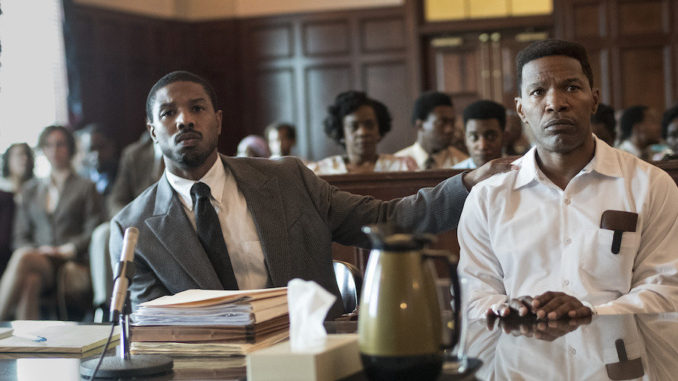
In the midst of awards season comes a film that will not be forgotten in the next round.
“Just Mercy” tells the story of Bryan Stevenson, a Harvard Law School grad who eschewed many top flight job opportunities to assist death row inmates cope with dubious convictions.
Stories like this have been told before, but rarely with such conviction and gripping intensity. Although the film starts out facing the same risks of other feel good films that leave you slightly hollow (I am looking at you, “Green Book”), in this case “Just Mercy” draws the viewer in with a steadily mounting tension that strains for release.
And unlike other films about racial disparity, the searing nature of the injustices in “Just Mercy” can’t be shrugged off after the lights come up.
Based on Stevenson’s book “Just Mercy: A Story of Justice and Redemption,” director Destin Daniel Cretton has written (with Andrew Lanham) a script that Cretton has brought to the screen in admirable fashion.
The film pivots between Michael B. Jordan as the clear-eyed, idealistic attorney and Jamie Foxx as Walter “Johnny D.” McMillian, the incarcerated murderer on death row.
 Most poignantly, the film is set is Monroeville, Alabama, which is otherwise best known as the hometown of two giants of American literature, Truman Capote and Harper Lee. Although the two were friends in their youth, it is only the latter who is referenced in “Just Mercy.” Lee’s Pulitzer Prize 1960 novel To Kill a Mockingbird is used almost like a defense shield by certain characters early in the film when the possibility of racial injustice is broached.
Most poignantly, the film is set is Monroeville, Alabama, which is otherwise best known as the hometown of two giants of American literature, Truman Capote and Harper Lee. Although the two were friends in their youth, it is only the latter who is referenced in “Just Mercy.” Lee’s Pulitzer Prize 1960 novel To Kill a Mockingbird is used almost like a defense shield by certain characters early in the film when the possibility of racial injustice is broached.
Jordan, who certainly proved his star trajectory in the lead role of “Black Panther” here brings a dignified strength to his role. It is through his eyes that we witness the mounting egregiousness of a two-tiered justice system. Into Stevenson’s bailiwick comes McMillan, who has essentially given up hope when it comes to seeking justice. Foxx is stunning in the way a mere glance or narrowing of the eyes can convey reams of what dialogue won’t accomplish.
 The true villains of the film are not one dimensional. Beyond the evil of those charged with delivering equality under the law, a pivotal role is played by Tim Blake Nelson. His versatility already well established (in “Watchmen” and in the titular role in “The Ballad of Buster Scruggs”) and here he is equally oily and compelling.
The true villains of the film are not one dimensional. Beyond the evil of those charged with delivering equality under the law, a pivotal role is played by Tim Blake Nelson. His versatility already well established (in “Watchmen” and in the titular role in “The Ballad of Buster Scruggs”) and here he is equally oily and compelling.
A tip of the hat to Warner Brothers, this is the third film in a trio that has put social justice issues front and center (“The Joker” and “Richard Jewell”).
But no question, “Just Mercy” is not a film that will easily be forgotten.

Be the first to comment